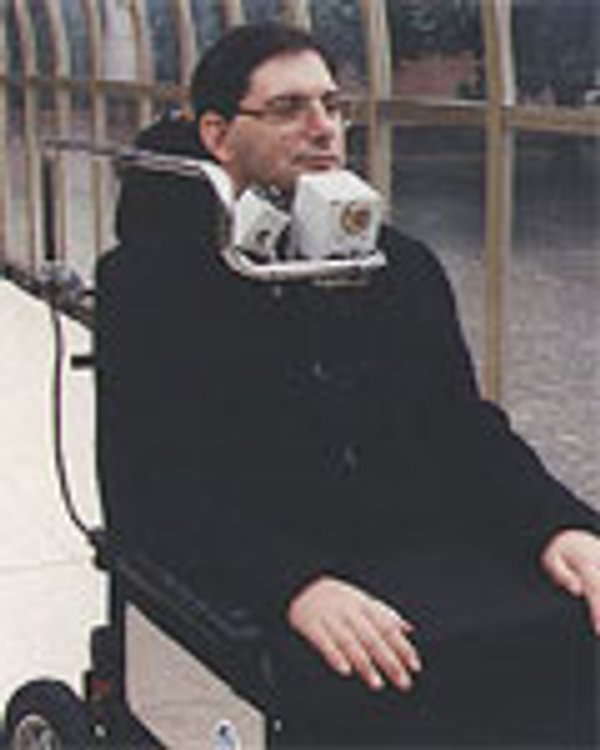Feeling that you are loved
Fr. Luis lives in Pamplona, and in his house you can feel the great affection of those who care for him. On entering his room one often finds him answering e-mail on his specially adapted computer or updating his web page: www.fluvium.org.
Sixteen years after the accident which left him in the care of others, he strongly affirms that “every human being needs an environment where he can feel that he is loved, whether sick or well, whether a child or an adult, whether needing or not needing a wheel chair. To feel understood and helped by others is a need for every person. We have feelings and a heart, we rejoice at the good news of others, and weep with those who weep. Animals cannot cry, nor laugh; but men and women can.”
It is impossible for a person who receives and gives affection to think of committing suicide. That affection helps to sustain the person, to keep him working. To feel that one is loved and needed by the people who are closest to us is very important, although this does not mean that discomfort, annoyance, or pain will not at times leave a person in bad humor. But one has to make an effort to appear cheerful, thinking of others in order to offer one’s sufferings to God. The life of Fr. Luis is a continual example of this cheerfulness, and many people are surprised so see the dignity with which he lives. In fact, on one occasion Fr. Luis even said that he feels "like a millionaire who has lost a ten dollar bill." He explains this with great simplicity: “I can’t allow myself to fall into a negative dynamic, thinking continually of how unfortunate I am to have suffered a traffic accident. I know that I have to continue working and carrying out my priestly ministry.”
And so he got down to work right away without letting any time pass. Immediately “after the operation, I continued giving classes and working as chaplain in the School of Architecture of the University of Navarre, as well as collaborating with other priests in the pastoral work with students.”
It’s not so important

Far from what one might imagine, Fr. Luis is not from outer space nor does he have a screw loose. He is very conscious that “I had an accident which impedes my mobility,” but, he adds, “it is something that is not so important." And he reveals the secret to moving forward: “Although it is difficult to confront it every day, the important thing is to know that I am a son of God and that God loves me and would never give me anything that was bad in itself. If God had had a bad intention in permitting the accident that caused my injury, he would have been cruel, and that is not possible with God. God is always good, and everything that I receive from him is for my good and that of others. And so I look at it as if I had lost a small bill compared with the millions that I have received and continue to receive from him. Perhaps it is that we don’t think much of what we are and are worth in being human: because God has wanted us to be persons. And this greatness of being human, the greatness of being persons, is not a matter of movement. Many animals are many times faster and more agile than we are! But they can neither reason nor love, nor do they have an eternal destiny in heaven.”
With his years of experience in “driving” a wheel chair, he has been asked to speak for those who might suffer or have suffered an injury like his. "I Iencourage them not to fall into the negative dynamism of considering, again and again, the innumerable misfortunes that they suffer as the result of a stupid accident . . . that they not let themselves be conquered by laziness or neglect, that they stay out of that vicious circle: how much I have lost, how unfortunate I am, I can never again do this or that… Everything becomes suffering and sorrow for how much I have lost, and this goes on forever. On the contrary, I encourage them to work, to seek activities, to subject themselves to a schedule, and not to consider those activities as a way of ‘passing the time,’ as a mere distraction. I tell them to think of what they still have and how to make that profitable. There are so many things to do; how can they not do anything? And if they can’t think of anything, let them contact me, and I’ll give them work to do.”
He also has words of encouragement for the families of accident victims and for those who take care of them. “I encourage them to realize the value of what they have at home. It is really a treasure. It helps them to work for others, to value life, to give and receive love. It makes them more human, more understanding. I tell them that they should feel the responsibility of loving with deeds those who need them so much and who seem to have been put with them to make it easier for them to love. They should feel certain that the greatness of each of them lies in this more than in anything else.” This is something that the goodness of Fr. Luis teaches us every day with his example, his dedication and his tenacity.
